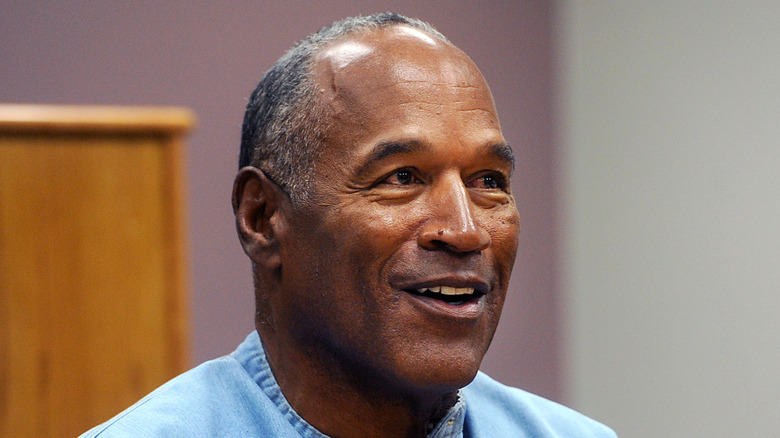OJ Simpson's Cause Of Death Explained
Former NFL star O.J. Simpson died at age 76 on Wednesday, April 11 after a long battle with cancer. Simpson's family broke the news on X on Thursday, noting that his children and grandchildren were with him at the time of his death.
Although Simpson was known as one of the greatest running backs in the NFL, his reputation was severely tarnished when he was charged with and acquitted of the stabbing death of his ex-wife Nicole Brown Simpson and her friend, Ronald Brown. Simpson would later serve a prison sentence for a Las Vegas robbery attempt.
Local 10 News in South Florida first reported Simpson's prostate cancer diagnosis in February 2024 and revealed he was undergoing chemotherapy. In a post shared to X that same month, the former football star laughed at rumors that said he was in hospice care. "All is well," he wrote as he offered well wishes for Super Bowl weekend. Just before Super Bowl LVIII, Simpson took to X again to share a video of himself sporting a 49ers jersey, thanking those who offered support following the news of his cancer diagnosis. He added that he was in good health and hoped to be playing golf in a few weeks.
About prostate cancer
The prostate is a walnut-sized gland that sits between the urethra and the bladder. Although cancer cells can develop inside the prostate without causing any symptoms, individuals with prostate cancer typically experience symptoms like an enlarged prostate, painful urination, problems with ejaculation, and dull back pain. Prostate cancer is diagnosed by a prostate-specific antigen (PSA) test that looks for a rapid rise that might indicate prostate cancer.
When prostate cancer is detected in its early stages, the survival rate up to regional stage 3 is between 80 to 85%, according to Comprehensive Urology. You're more likely to survive prostate cancer and remain cancer-free when it's detected early. When prostate cancer reaches stage 4, it has spread to other parts of the body. It's in this advanced stage that the survival rate dips to 28%, according to Johns Hopkins Medicine.
Most types of prostate cancer are adenocarcinomas and grow slowly. However, more aggressive forms of prostate cancer, like Squamous cell carcinomas, grow much faster. At the time of writing, it is not known what type of prostate cancer Simpson had. Although prostate cancer is the second most common type of cancer among men (next to skin cancer), African American men have a higher prevalence of prostate cancer. The American Urological Association suggests getting a prostate cancer screening if you're over 45, African American, have a family history of prostate cancer, or have experienced any prostate cancer symptoms.


